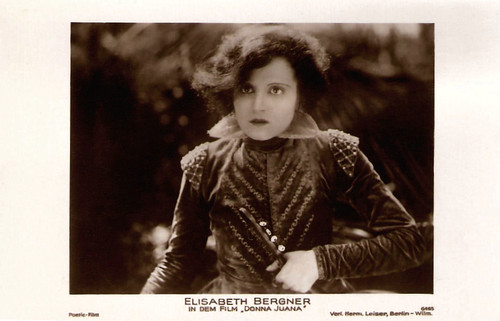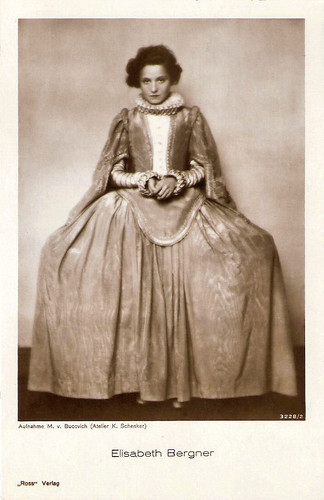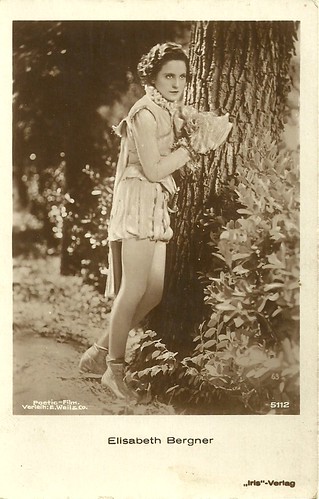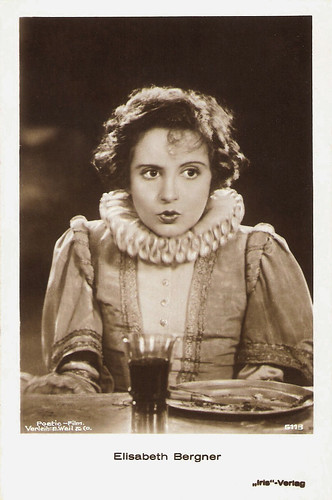
German postcard by Verlag Hermann Leiser, Berlin-Wilm. no. 6464. Photo: Poetic-Film. Elisabeth Bergner in Doña Juana/Donna Juana (Paul Czinner, 1928).

German postcard by Verlag Hermann Leiser, Berlin-Wilm., no. 6465. Photo: Poetic-Film. Elisabeth Bergner in Doña Juana/Donna Juana (Paul Czinner, 1928).
Raised as a boy
Doña Juana (1928) was based on a traditional Spanish seventeenth-century play by Tirso de Molina. An impoverished nobleman (Max Schreck) raises his daughter Juana (Elisabeth Bergner) as a boy because he believes he cannot marry her off in a manner befitting her station. When she falls in love with a nobleman (Walter Rilla), her father wants to send her to a convent.
The young man is also to be married off to a rich girl at his father's request. Feeling betrayed, Juana travels ahead of her lover and introduces herself to the beauty intended for him under his name. After a few complications, the two of them can finally count on the consent of their unruly fathers.
Doña Juana was scripted by Béla Balázs and Paul Czinner. Balázs later tried to have his name removed from the credits because he disliked the finished version of the film. The cinematography was by Karl Freund, assisted by Robert Baberske and Adolf Schlasy, while sets were by Erich Kettelhut and costumes by Edith Glück and Leo Pasetti.
The film was produced by Poetic-Film on behalf of Ufa. The film was shot on location around Seville and Granada in southern Spain, in July-October 1927.
The film had its world premiere during a special screening on 27 December 1927 at the Vienna Elite-Kino, while the first public screening was in Vienna on 12 January 1928. The German premiere took place on 24 January 1928 in Berlin, at the cinema Gloria-Palast.

German postcard by Ross Verlag, no. 3228/2, 1928-1929. Photo: Mario von Bucovich (Atelier Karl Schenker). Elisabeth Bergner in Doña Juana/Donna Juana (Paul Czinner, 1928).

German postcard by Ross Verlag, no. 3228/3, 1928-1929. Photo: Mario von Bucovich (Atelier Karl Schenker). Elisabeth Bergner in her outfit for Doña Juana/Donna Juana (Paul Czinner, 1928).
From mischievousness to melancholy and deep heartbreak
The Österreichische Film-Zeitung reviewed on 24 December 1927: "In this film, which gives Bergner the opportunity to develop her great art, she actually succeeds in playing all the registers of dramatic representation, from mischievousness to melancholy and deep heartbreak, in an exemplary manner.
She finds the opportunity to do this through the neatly crafted script written by Béla Balász, which is characterised by a logically constructed, strictly avoiding improbabilities and a clear plot.
A skilful direction that is attuned to atmospheric detail, as well as the soft, picturesque photography, which especially emphasises the scenic beauty of Spain, the country in which the film is set, and which brings truly magnificent images, do the rest to make the whole film Donna Juana a masterpiece."
Vienna's Neue Freie Presse noted on 15 January 1928: "In the leading role, Elisabeth Bergner means here that one gets the opportunity to admire the whole kaleidoscope of the skills of this amazing artist.
One does not need to overestimate Bergner to nevertheless realise that one never tires of enjoying her in this film like a flashing brilliant that is slowly turned in the light to let all facets shine individually. (...) The other actors are also excellent."

Austrian postcard by Iris Verlag, no. 5112. Photo: Poetic Film / Distr. E. Weil & Co. Elisabeth Bergner in Doña Juana/Donna Juana (Paul Czinner 1928).

Austrian postcard by Iris-Verlag, no. 5113. Photo: Poetic-Film / Verleih: E. Weil & Co. Elisabeth Bergner in Doña Juana/Donna Juana (Paul Czinner, 1928).
Sources: Filmportal.de (German), Wikipedia (German and English) and IMDb.
No comments:
Post a Comment